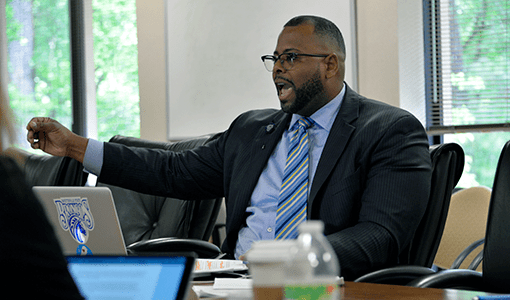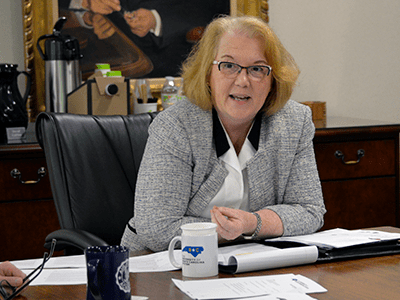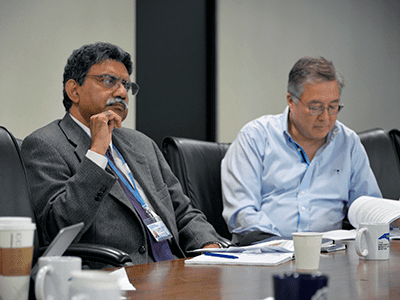
UNC SYSTEM FACULTY FELLOWS EXPLORE UPPER ADMINISTRATION
The UNC System emphasizes that it is one University, comprised of 17 unique institutions. As President Margaret Spellings is fond of saying, “Our institutions are individually remarkable, collectively extraordinary.”
We are many, but one. This paradox can present its fair share of conundrums: how does the UNC System promote the distinct and remarkable nature of each of its institutions while also maintaining a shared sense of purpose? How can faculty members fulfill their individual research goals, teaching obligations, and their home institution’s mission while also making meaningful contributions to System-wide operations? How can the University single out individuals–from among the thousands teaching at 17 far-flung institutions–who will have the capacity to step into administrative roles?
For three years and counting, the UNC System Office’s Division of Academic Affairs has organized and funded a Faculty Fellows program to help address these challenges.
Last week, Faculty Fellows convened for the second of four quarterly meetings
On hand were 2018’s three fellows: Fayetteville State University’s Dr. Peter Eley; North Carolina A & T State University’s Dr. Alice Stewart; and Appalachian State University’s Dr. Krista Terry. Because the System Office recently restructured the program to run concurrently with the calendar year instead of the school calendar, this year’s fellows were joined by UNC Greensboro’s Dr. Vidyaranya Gargeya, a member of the 2017 cohort whose tenure comes to a close this summer.
Finding, Supporting, and Leveraging New Ideas
Innovation. It begins with an idea—or sometimes two or three.
At the core of the Faculty Fellows program is a search for the next generation of administrators who will have the creativity and vision to lead the University as it continues its perpetual quest to serve North Carolinians better and with more efficiency. Appropriately, program applicants—all established faculty, primed to move on to the next stage of their careers–are asked to submit a research proposal related to teaching or higher education administration. The selection committee invites proposals that delve into focus areas of “particular near-term importance” to the University, such as student success in undergraduate education, research administration and planning, learning technologies, and K-12 to college transitioning.
“Being a faculty fellow has given me … a better sense of how we fit in.”
Fayetteville State University’s Dr. Peter Eley

Applicants are selected in part based on their research proposals’ broad applicability across the System. For example, Peter Eley is exploring what tools might help K-12 schools in rural counties minimize the participation gaps in math courses so that their students are better prepared to succeed in college. Alice Stewart is investigating how learning technologies can help students acquire competencies that will drive regional workforce development. Krista Terry is comparing the benefits of competency-based and modular approaches to teaching in online education. Vidyaranya Gargeya has studied the internal review processes for evaluating graduate programs, which play an essential role in helping institutions decide when to introduce new programs and whether or not to sustain existing ones.
Fellows receive financial and structural support from the System Office to carry out the research. This support includes a funded reduction in teaching load, one month of summer salary, and funding to present the research at a national conference.
In return, the UNC System gets some valuable input, which could very well influence policy and improve teaching across the University. By harnessing the creative energies of faculty, the System Office can expand its exploratory capacity and its ability to problem solve with more depth and efficiency. “We are stretched thin at the System office, often with only one or two people here collaborating on any given project from time to time. But when you have two fellows working on the same problem in their research, then you have real faculty involvement that can help us dig deeper into the issue at hand,” says Dr. Kim van Noort, interim senior vice president of Academic Affairs at the System Office.
By the same token, the fellows return to the classroom with a heightened sense of how individual teaching strategies can align with System-wide administrative initiatives for bolstering student success. Following his tenure as a Faculty Fellow, Dr. Patrick Akos, professor of education and school counseling program coordinator at UNC-Chapel Hill, returned to his classroom better prepared to “teach future counselors and educators from a broader policy lens” and with a better sense of “how the System’s work informs and impacts the interventions and teaching educators do day-to-day.”
In the long run, the program’s investment in faculty research offers exponential returns on investment by helping more North Carolinians get to college and to walk away with a degree in hand. “I focus a lot on transitions in P-12,” Akos explains, “The fellows program opened up the P-16 continuum with a focus on student success.” Revealingly, the UNC System continues to tap into Akos’ research interest in continuum education, inviting him to participate in the Math Pathways initiative. In this capacity, he is helping redesign core curricula so that students have greater flexibility linking their math requirements to their degree and career goals, making the relevance of gateway courses more obvious to all students, even those who aren’t majoring in math.
Tomorrow’s Leaders Today
Beyond supporting research that could very well improve student success rates or administrative efficiency across the System, the program exposes the fellows to the day-to-day responsibilities of upper administration.
The yearlong fellowship kicks off with an orientation that gives the new fellows a chance to see how the System Office is organized and to spend time meeting with state and federal legislative relations specialists. With each subsequent meeting, the group drills down on a particular issue facing the System and discusses relevant common core readings, carefully curated by members of the System Office’s Division of Academic Affairs (sometimes based on input from previous years’ fellows). These gatherings are timed to coincide with meetings of the University’s chief academic officers so that the fellows have an opportunity to weigh in on the pressing matters related to instruction and research support. Finally, fellows receive funding to attend two Board of Governors meetings.
Beyond regularly convening, each fellow is paired with not one, but two mentors—one internally at the System Office and one at another institution. “Michelle Soler, my internal mentor, has connected me with about 1,576 people in the state,” beams Krista Terry, promising that her number is only a “slight exaggeration.”

“She has been an incredible source of information on how to proceed with developing my project,” Terry continues. “Working with her is absolutely one of my career highlights.”
On another level, the mentoring partnerships and the immersion in operations give the fellows more perspective on the demands of being a high-level administrator, providing a broader view of how the System Office operates, how the University engages with legislators, and how information gets distributed across 17 institutions.
Vidyaranya Gargeya suggests that one of the more valuable components of the fellowship has been simply having quality time and interactions with University leadership. Last year, the fellowship funded Gargeya’s attendance at a conference of the Association of Public and Land-grant Universities (APLU). “On my own campus, it would be difficult to get 45 minutes to speak with my own Chancellor, Frank Gilliam. At the APLU conference I got to chat with him at great length!,” he mused wryly.
Perhaps more significantly, the University’s investment gave Gargeya the opportunity to interact with senior level administrators from across the country at APLU. While Gargeya has already held leadership positions, such interactions have sharpened his sense of what type of administrative responsibilities he’s most interested in pursuing. Over the course of the year, he’s acquired an appreciation for the wide variety of work administrators tackle, and not all of it is suitable for his interests and skillset: “The Faculty Fellows program has given me more focus in terms of what kinds of administrative jobs I would be interested in.”
Peter Eley explains how this process of engagement illuminates his understanding of the relationship between his home institution and the other universities in the System: “I have a better sense of FSU’s place in the system. What is our niche? Being a faculty fellow has given me … a better sense of how we fit in.”
“The Faculty Fellows program has given me more focus in terms of what kinds of administrative jobs I would be interested in.”
Of course, there’s always the risk that such an intensive immersion will send faculty running in the opposite direction, away from administrative offices and back into the classroom, where they won’t have to ponder how to maximize student outcomes and teacher effectiveness within an ever-evolving political climate shaped by budget restraints, shifting priorities, and structural limitations.
But so far, this year’s cohort has only grown more enthusiastic about taking on leadership roles. “Am I still interested in administration? Absolutely,” says Eley, “I’m just waiting for my opportunity.”
UNC Asheville’s Dr. Karin Peterson, another member of the 2017 cohort, confirms that participating in the proceedings gave her a more informed sense of what higher leadership in public education looks like: “In addition to my research, the fellowship introduced me to the priorities of the UNC System and to national trends and issues in higher education. Understanding the ongoing projects of the Academic Affairs unit of the System Office has given me a greater appreciation for what it takes for a state to be committed to providing a quality higher education for its citizens.”

The UNC System office could certainly point to Peterson’s recent professional trajectory as a case study, demonstrating the program’s ability to cultivate leadership talent.
“Partly as a result of my experience with the fellowship,” Paterson explains, “I have been given the opportunity to serve as acting provost at UNC Asheville. Understanding priorities of the State, the current issues facing public universities, and having frameworks to think about leadership are key learnings that inform the work I am doing in this role.”
And this enthusiastic desire to lead helps transform one remarkable institution into something even bigger: one part of an extraordinary collective.